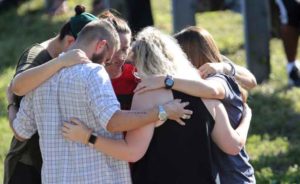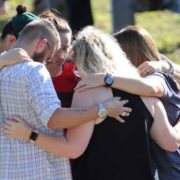Before the Tragedy: The Work We Must Do with Children Right Now
Dear Sweet friend,
How do you make sense of a senseless act?
When 17 people, students and staff, are killed in and around their school, a place typically regarded as a safe haven for those who attend, how can we explain it to children? How do we explain it to ourselves?
attend, how can we explain it to children? How do we explain it to ourselves?
I’ve written several articles on how to talk to kids when bad things happen (like here and here). But we’ve gotten to a point when there is much more to the discussion that dealing with the aftermath, don’t you think? I would imagine you would agree, we need to turn our attention to what’s going on with our children these days that is laying the groundwork for such tragedies to occur.
We need to turn our attention to what’s going on with our #children these days that is laying the groundwork for such tragedies to occur. #ParklandSchoolShooting Click To Tweet- Mental Instability and the need for help: It’s easy for people to point to a killer and simply say, “he is mentally disturbed.” And yes, there are clearly mental issues happening here–chemical imbalances that need to be addressed. But what does this really tell us? What we need to take in is the fact that many people who have mental issues were once children or teens who needed help. Perhaps they needed counseling, medication or more. This is not something people can wish away- mental illness must be considered and treated appropriately when we see it.
- Lack of empathy: I interviewed internationally adored, educational psychologist, Dr. Michele Borba, for my most recent podcast and she talks a great deal about the lack of empathy as a precursor for future violence. When we can’t put ourselves in someone else’s position and feel how they feel in that moment, our behavior can become cruel and unfeeling. What does this tell us? It says that we must make working on empathy and other key powerful words with children a priority. Helping children identify their own feelings, read the faces and body language of others, predict future actions based on their behaviors and repair damage done is vital. We can’t only attend to academics. Character and whole-heartedness must be on our daily agenda too.
- Isolation and a need for a mentor: When I present to parents, educators or other adults who work with children, I often talk about the youth development research. One sobering statistic from a study done with Search Institute said that the majority of young people feel that they don’t have at least 3 adults to turn to in a time of need or challenge. What’s more is that many young people don’t feel that adults understand them or that adults can give them bad advice or leave them scrambling on their own when the advice doesn’t work. We need to help make things better, not worse. What does this tell us? It means that young people need us. They need us to take an interest, to listen, if asked for- they might need advice, but ultimately, they need someone to care for the long haul. Let’s be one of the three.
- Seen for their faults: In today’s society, people often feel scrutinized for how they don’t measure up. They “compare and despair” as my podcast guest, Debbie Reber said, which can only serve to make them feel like they can never be enough. One of the issues I often discuss in my presentation Be a Strength Finder, Not a Fault Finder is that often our labels (whether self-imposed or given by others) can define us and lock us into a negative state of being. “I am ugly…I am lazy…I am stupid…I am a bad kid…I will never amount to anything” – these become repeated mantras that don’t only play with our minds but guide our actions. They become self-fulfilling prophecies. So what does this tell us? It says that while we need to provide guidance and corrections for our children, we also must illuminate their strengths. We need to tell them of the gifts we see in them and in others—and hold a mirror up to them so that they can see themselves for what they bring to the table. When we lead with strengths, they guide us forward. When we lead with faults, they hold us back.
We are shocked, or tragically, perhaps not as shocked now, when school shootings occur. In the moment, it is so jarring and we feel like there is nothing we can do. Thoughts and prayers are lovely but they don’t address the issues. The actions we must take are ones that happen in the years before the shooting. And that means, let’s start on it now.
- Get children mental help when they need it.
- Do social skills training with kids who are lacking in empathy.
- Be a mentor or help find a mentor for children who can use some guidance.
- See children for their strengths, not simply for what they lack.
These are small things that make a big difference. And lord knows, we need a difference right now.
Xoxo




 Self Esteem & Success: Have your Children and Students Developed their C.O.R.E.™?
Self Esteem & Success: Have your Children and Students Developed their C.O.R.E.™? 
